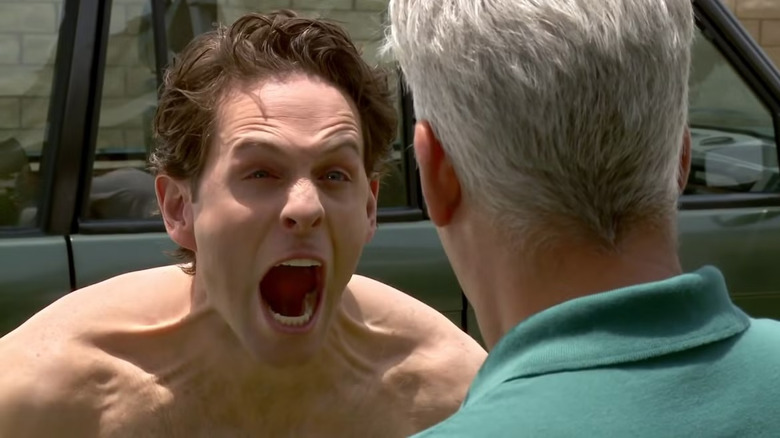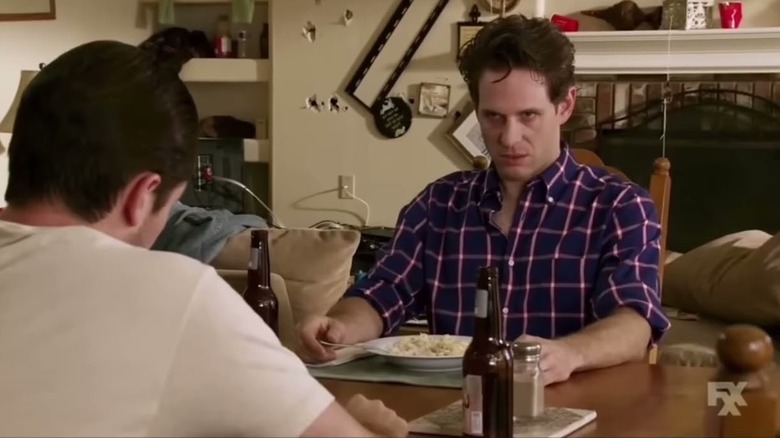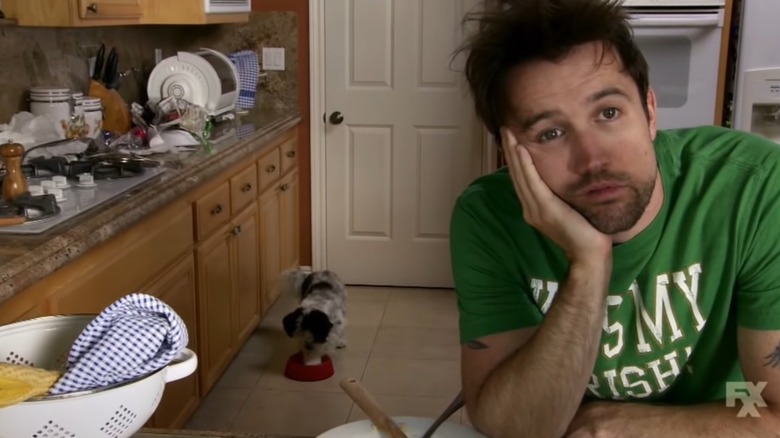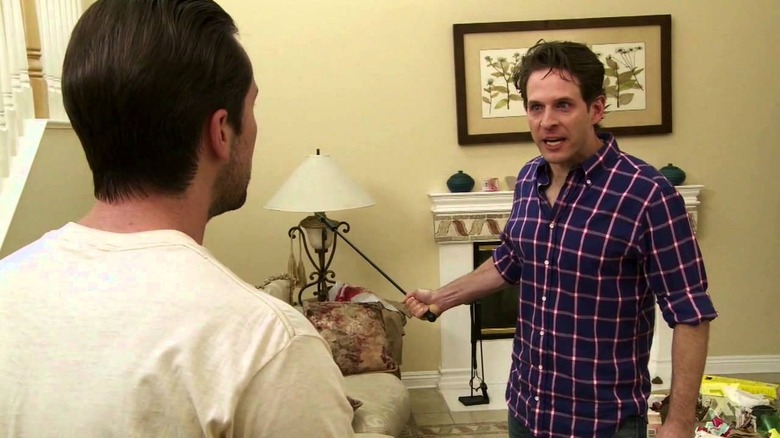The Best Episode Of Always Sunny Pays Homage To A Classic Horror Film
Arguably the best episode of "It's Always Sunny in Philadelphia" is the season 11 banger "Mac & Dennis Move to the Suburbs," an episode that really only follows two members of the gang but manages to be chock full of laughs. The episode is among the highest rated on IMDb and seems to be pretty universally appreciated by fans. While there are a handful of "Always Sunny" episodes that play with horror elements, like "The Maureen Ponderosa Wedding Massacre" and "Charlie's Home Alone," but "Mac & Dennis Move to the Suburbs" draws from one of the greatest horror movies of all time: Stanley Kubrick's "The Shining."
The episode follows Mac (Rob McElhenney) and Dennis (Glenn Howerton), who are unable to find an apartment that fits their needs after they burned their own place down. They decide to move to a big house in the suburbs, where their rent money will stretch much further. Unfortunately, suburbia brings out something truly sinister in both of them, pushing the two city boys to new lows while giving the audience a whole lot to laugh about. As Dennis in particular devolves into madness in his big, beautiful home, he mirrors Jack Nicholson's Jack Torrance snapping in the snowscape of "The Shining," and it's a bit of comedic brilliance.
A twisted take on a crumbling marriage
The overall premise of the episode is similar to that of "The Shining," as both follow a man going insane and becoming murderous while caring for a large estate. Mac and Dennis's suburban house may not have a hedge maze, but it does have two swimming pools! Dennis starts really losing his mind in the grind of his commute, listening to Bryan Adams and screaming homicidal threats at other drivers, and he brings that derangement home with him.
As Dennis's rage starts to get the better of him, he becomes paler and sweatier, with a wild look in his eye. His threats of slitting throats on the highway turn into a hallucination where he rips off all of his clothes and screams in his neighbor's face, his grip on reality completely dissolving. Instead of talking to Lloyd the (possibly) imaginary bartender, Dennis loses his cool and shouts at neighbor Wally, who really isn't there. Like The Overlook in "The Shining," the house in suburbia is driving Dennis towards slaughter.
There aren't any ghosts in Mac and Dennis' house, but there are plenty of little things that contribute to their deteriorating sanity. There's a loud pool filter and a smoke alarm that keeps beeping, keeping them both up all night. There's also the specter of Mac's loneliness, as he's unable to find any happiness without Dennis around to give him approval. But what it really all boils down to is that it's not the house driving them mad — it's being trapped with one another, without anyone else around to cut the tension.
Mac and Dennis mirror Jack and Wendy
Dennis' downward spiral is started by traffic, but it's his fury at each of the little annoying things that Mac does that leads him to his real breaking point. Likewise, Mac feels abandoned by Dennis, who makes him stay home to work on the house and forces him into a homemaker role that he "didn't go to school for." Mac is tortured by the house just like Dennis, but he doesn't have his roommate's rage issues. He also has to contend with that rage when it's directed at him, which happens pretty frequently. As a result, Mac becomes even more dejected and sulky than usual, losing his mind right along with Dennis. In a way he mirrors Wendy (Shelley Duvall), who does her best to hold it all together when her husband Jack starts going insane in the Overlook.
Though Mac doesn't have a human child to care for, he does have Dennis Jr., a dog that Dennis gave him in an attempt to help his loneliness. He even tells Dennis that he'll "raise him like our own son." Instead, Dennis Jr. dies of neglect and Mac feeds the dog to Dennis in his dinner, a scene that's more "Fatal Attraction" than "The Shining" but still plenty disturbing. That dinner and the discovery of a closet full of mac 'n' cheese boxes is what finally sends Dennis over the edge, leading him to grab a fire poker and threaten violence.
Lots of little homages
Some of the biggest nods to "The Shining" are the smallest, as many are just great visual gags or smash cuts with sharp musical cues. One of the easiest to spot is Dennis' appearance at the dinner table shortly before eating Dennis Jr., which directly mirrors Jack's crazed stare across his typewriter, one of the first hints in "The Shining" that he's starting to unravel. The second is the way he's framed with the fire poker, which looks an awful lot like Jack coming after Wendy when he chases her up the stairs in the film's climax. The passage of time is also depicted similarly in both, with a quick sting of string music and title cards that tell us how much time has passed. One homage that was likely not intentional but is still rather on-point? The macaroni boxes cascade out of the closet an awful lot like the blood pouring out of the elevator doors in "The Shining." Now that's funny.
Horror and comedy are two sides of the same coin, which is probably why there are so many great comedians who have worked in horror, and the gang behind "It's Always Sunny" seem to understand riding the line between them very well. Dennis is the show's darkest character (and is almost certainly a murderer by the end of season 16), and allowing him to step into the shoes of one of horror's greatest villains was a stroke of comedic brilliance. Sometimes it's scary just how funny "It's Always Sunny" can be.



